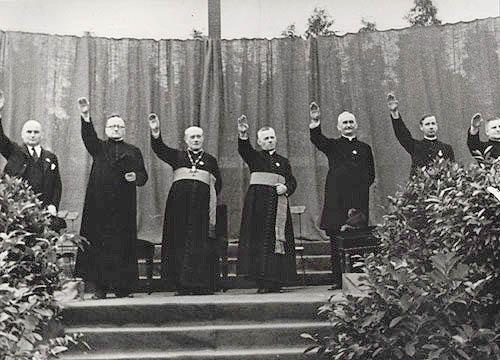You’re a preacher and you know you need to address the assault against humanity and our planet that is being perpetrated by the Trump administration. But some things are holding you back. Maybe you don’t feel informed enough about certain issues. Maybe you don’t feel you received enough training in seminary for how to preach a prophetic sermon. Maybe you’re afraid of the push-back from members of your congregation if you tackle topics that seem too “political.” Or maybe you just need a shot of homiletical chutzpah.

If you’re reading this, consider yourself part of the new Prophetic Preacher of the Month Club. Below are my recommendations for the coming year. This is an arbitrary list, I know. And there are many more that could (and should) be included. But this is a start. If you read just one book a month, you will increase your effectiveness as a preacher and be doing a great service for those in your congregation who are looking for a sermon that addresses the issues that matter to them, to our communities, to our Earth, and to “the least of these.”
RIGHT NOW
Preaching in the Era of Trump; O. Wesley Allen (Chalice Press, 2017)
Preaching in the Era of Trump is like a much needed urgent-care facility for preachers reeling from the election and its aftermath. Wes Allen offers not only an accurate diagnosis for how our country and the church has found itself in this place of crisis, but prescribes effective strategies for preachers to address the fear, turmoil, prejudices, hatred, and divisiveness of this time, as well as the need for proclaiming prophetic justice. While never mincing words about the staggering array of evil now before us, Allen also reminds us in this must-have book that the preacher’s task is to address the humanity of our congregations, even while casting out the demonic forces that hold us in thrall.
MARCH
Preaching Fools: The Gospel as a Rhetoric of Folly; Charles L. Campbell and Johann H. Cilliers (Baylor University Press, 2012)
You’ll be reading this book in preparation for Sunday, April 2, the day after April Fool’s. There will be many times when you feel like an utter fool in the pulpit against the powers of evil-on-steroids that have strengthened with this president. Campbell and Cilliers’ book will not only help you rethink and reframe the homiletical task, it will equip you with stories, images and metaphors for helping your congregation celebrate their role as “fools for Christ,” proclaiming the message of the cross that tells the truth and calls the gospel-reality into existence.
APRIL
Creation-Crisis Preaching: Ecology, Theology and the Pulpit; Leah D. Schade (Chalice Press, 2015)
Shameless self-plug here, I know. But Trump has appointed some of the most heinous climate-denying, anti-environmental, anti-public-health people ever for the positions of leadership in the White House. So preachers need to keep Creation-care front and center for their congregations. Especially as the world celebrates Earth Day, we need sermons that will prophetically and creatively engage this reality in the face of the climate-change denial exhibited by the incoming administration. This book will provide theological and scriptural background for greening your preaching, as well as practical tips for becoming an “ecopreacher.”
MAY
Telling the Truth: PreachingAbout Sexual and Domestic Violence; Edited by John S. McClure and Nancy J. Ramsay (United Church Press, 1998)
With Mother’s Day this month, the focus is on women. The onslaught against women’s access to reproductive health and their right to choose how to make decisions about the most intimate parts of their bodies is exacerbated by a misogynist president who bragged about sexual assault. Nearly every congregation in this country has victims, survivors, or perpetrators of sexual and domestic violence in its pews. This is the book I recommend for preacher who need sage guidance about how to address these issues as a pastor and a preacher. The collection of 15 essays covers theological and biblical perspectives, provides resources for telling the truth about sexual and domestic violence, gives practical how-to’s for preaching, and includes model sermons.
JUNE
Preaching Justice: Ethnic and Cultural Perspectives; Edited by Christine Smith (Wipf and Stock, 1998)
This is an ideal time to familiarize yourself with the standpoints of “the other.” Whether you are a white preacher looking for an essay from an African American woman’s perspective (provided by Teresa Fry Brown), or an African American preacher wondering how Korean Americans fare in this country (explained by Eunjoo Mary Kim), or a Latina/o preacher wanting to help your congregation understand the Jewish perspective on justice (shared by Stacy Offner), these and five other essays will expand your preaching horizons.
JULY
Resisting Structural Evil: Love as Ecological-EconomicVocation; Cynthia D. Moe-Lobeda (Augsburg Fortress, 2013)
The summer is a good time for a sermon series on the ways in which systemic evil attacks “the least of these.” While Moe-Lobeda’s book is not aimed at preachers per se, her approach to the complexity of interrelated structures of evil is very helpful for sermons because she provides case studies that give us glimpses into the lives of real people affected by the decisions we make every day. The first half of the book will give you incredible insights into the economic and ideological patterns that gave rise to Trumpism in the first place, while the second half of the book provides concrete approaches to galvanizing yourself and your community for resistance.
AUGUST
Under the Oak Tree: The Church as a Community of Conversation in a Conflicted and Pluralistic World; Edited by Ronald J. Allen, John S. McClure and O. Wesley Allen Jr. (Cascade Books, 2013)
You’ll be reading this book in preparation for leading a series of conversations in your congregation about some of the “wicked” (i.e. complex) problems our country is facing. The task of preaching about difficult social justice issues is helped when we have cultivated a culture of dialogue in our congregations. Under the Oak Tree contains eleven essays to help you think through the concept of conversational practical theology and how to view the tasks of ministry (including preaching, worship, evangelism and interfaith relations) through this lens of conversation.
SEPTEMBER
Prophetic Preaching: A Pastoral Approach; Leonora Tubbs Tisdale (Westminster John Knox Press, 2010)
With the “community of conversation” as your frame of reference, you’ll read Tisdale’s book to give you that infusion of courage for addressing social issues in the pulpit in tandem with the dialogue series you’ll be leading this month. The author suggests a myriad of reasons why pastors resist preaching about justice issues and offers practical suggestions for ways to be both pastoral and prophetic in their preaching. This book offers specific strategies to break through resistance as well as a variety of forms to help spark your prophetic imagination.
OCTOBER
Preaching as Weeping, Confession and Resistance: Radical Responses to Radical Evil; Christine M. Smith (Westminster/John Knox, 1992)
The month of October brings out the ghosts and goblins as our culture celebrates Halloween. Consider a sermon series entitled “Something Wicked This Way Comes” and address the true demons loosed on our society. Christine Smith’s book gives you the theological and biblical tools to address handicappism, ageism, sexism, heterosexism, white racism and classism. The last chapter provides some model sermons to prime your preaching pump.
NOVEMBER
Preaching Politics: Proclaiming Jesus in an Age of Money, Power, and Partisanship; Clay Stauffer (Chalice Press, 2015).
November is usually the month when churches launch their stewardship campaigns. This year as we contend with a president who wouldn’t even be forthcoming about his tax returns or divest himself from his companies, help your congregation understand why Jesus’ teachings speak a necessary ethical corrective. Stauffer provides a guide for understanding the need and biblical justification for preaching about the politically contentious issues of money, greed, and power within a capitalist society. With sound exegesis of key teachings of Jesus on money and faith, as well as robust theological engagement with Stanley Hauerwas and Adam Hamilton, this book is useful for both preaching and leading Bible studies. Stauffer encourages, equips and emboldens preachers to tackle these issues from the study and the pulpit with renewed confidence.
DECEMBER
Living Beyond the “End of the World”: A Spirituality of Hope; Margaret Swedish (Orbis Books, 2008)
If you follow the Revised Common Lectionary, the Advent readings contain the apocalyptic texts of Jesus. The Bible does not shy away from naming the upheaval in our world, and neither does Swedish. Yet she challenges us to articulate what kind of human beings we will be as we approach this difficult period in human history, and how we will live into that. With solid biblical exegesis (especially her treatment of the “loaves and fishes”) your preaching will benefit from the way she clearly presents the values, vision, and spiritual resources that can nurture a new human community even when the evidence points to the world falling apart.
The Rev. Dr. Leah D. Schade is the Assistant Professor of Preaching and Worship at Lexington Theological Seminary; Lexington, Ky. Contact her at lschade@lextheo.edu. And visit The Purple Zone website to learn more.







 But after that Pharaoh died, a new one who was a tyrant eventually came to power, and things changed. He enslaved the Israelites, forcing them into hard labor making the pyramids and serving the Egyptians’ every need. So they not only stole the Israelite’s freedom, they stole the people’s labor. If ever the Israelites tried to get what they needed to survive (like that little boy), they were accused of stealing and severely punished or incarcerated for breaking the rules. The Israelites were denigrated by the Egyptians – called terrible names and made to feel like nothing more than work animals, so in fact their own humanity was stolen from them.
But after that Pharaoh died, a new one who was a tyrant eventually came to power, and things changed. He enslaved the Israelites, forcing them into hard labor making the pyramids and serving the Egyptians’ every need. So they not only stole the Israelite’s freedom, they stole the people’s labor. If ever the Israelites tried to get what they needed to survive (like that little boy), they were accused of stealing and severely punished or incarcerated for breaking the rules. The Israelites were denigrated by the Egyptians – called terrible names and made to feel like nothing more than work animals, so in fact their own humanity was stolen from them. Just writing the Catechism was a radical act for its day. Most of us were taught to think about the Catechism as a morality document. How many of you went to Catechism classes, or sent your kids to Confirmation classes? You probably thought that you were sending them to learn the basics of the faith and to instill in them moral values to make them good people. And that is certainly part of what Luther intended.
Just writing the Catechism was a radical act for its day. Most of us were taught to think about the Catechism as a morality document. How many of you went to Catechism classes, or sent your kids to Confirmation classes? You probably thought that you were sending them to learn the basics of the faith and to instill in them moral values to make them good people. And that is certainly part of what Luther intended.
